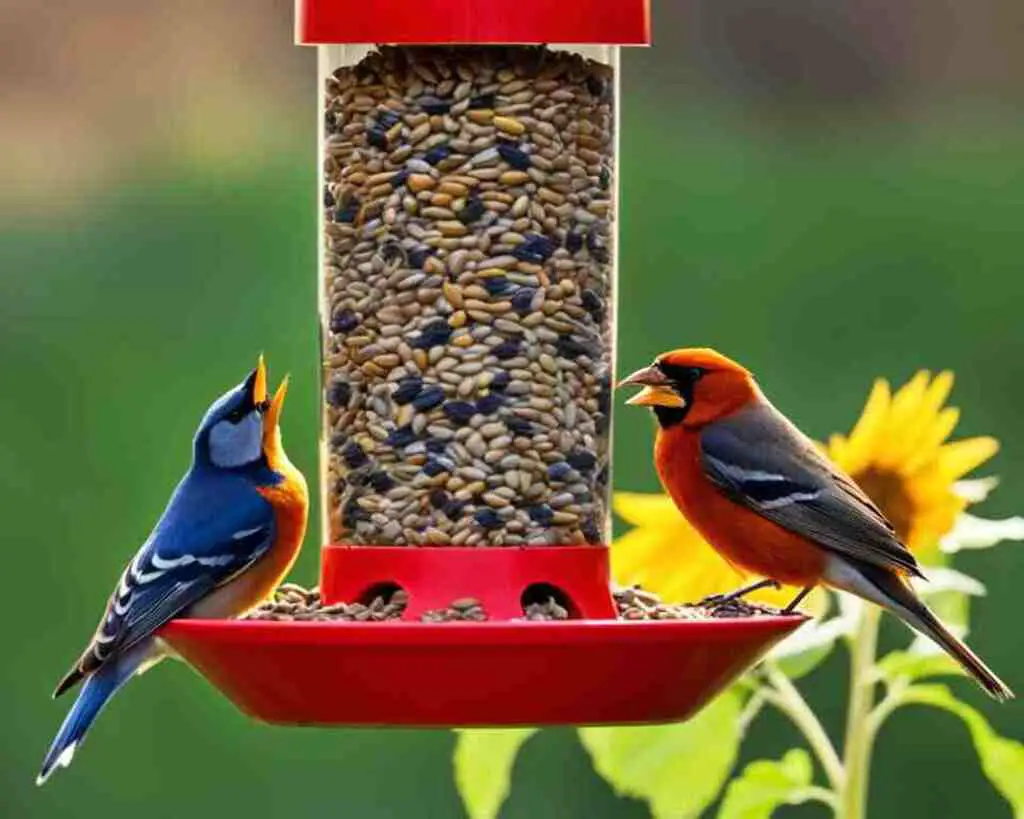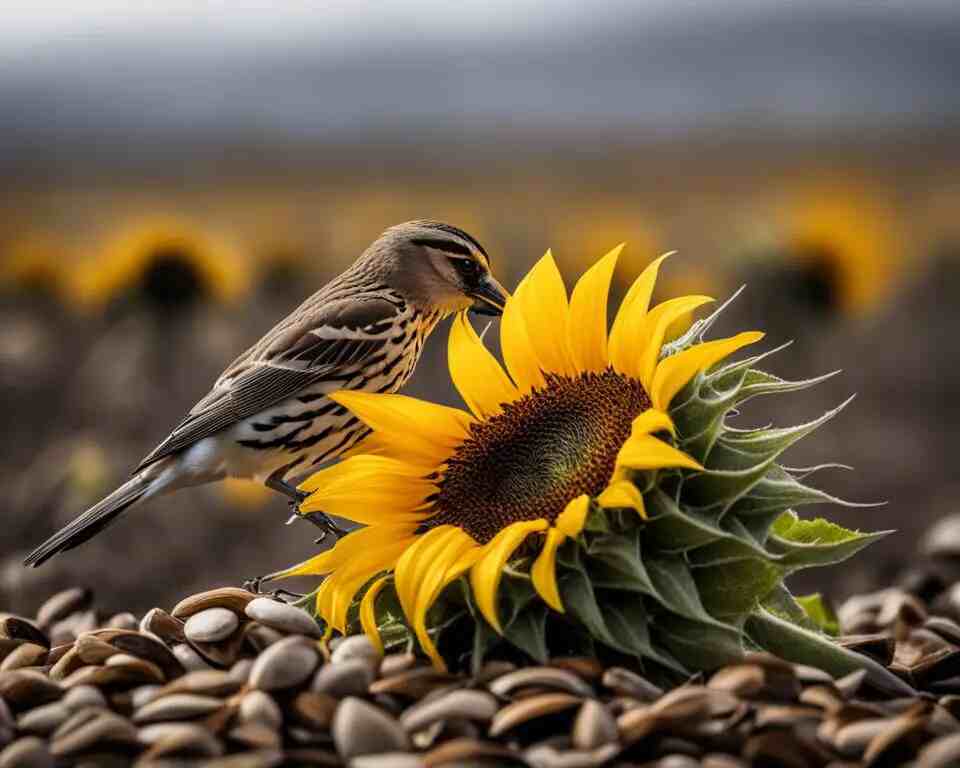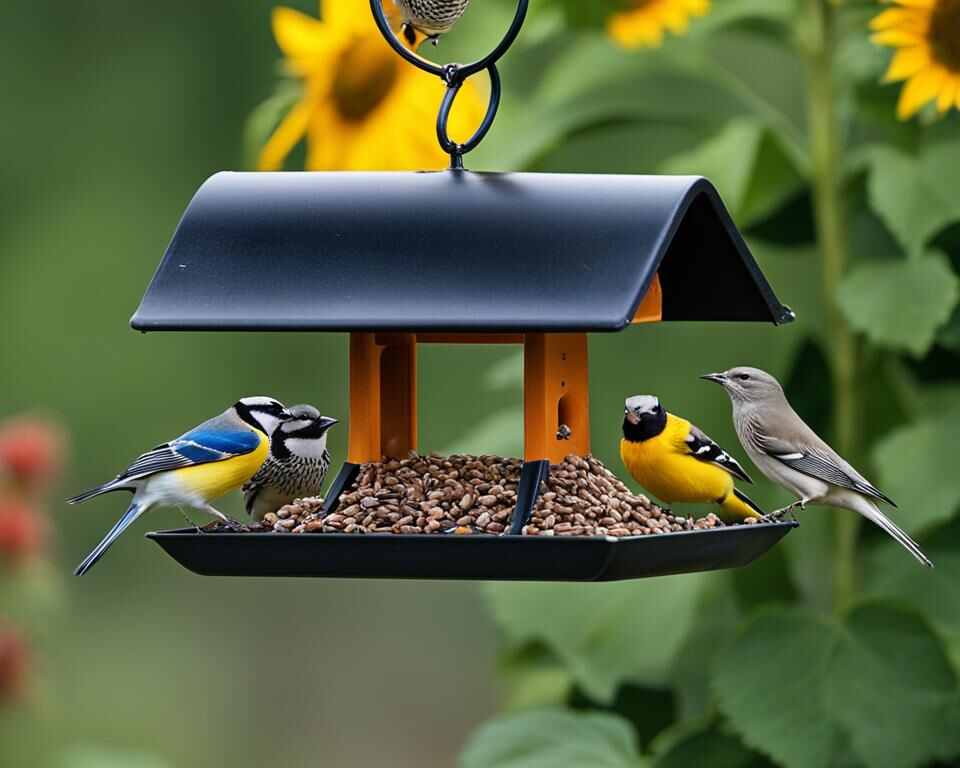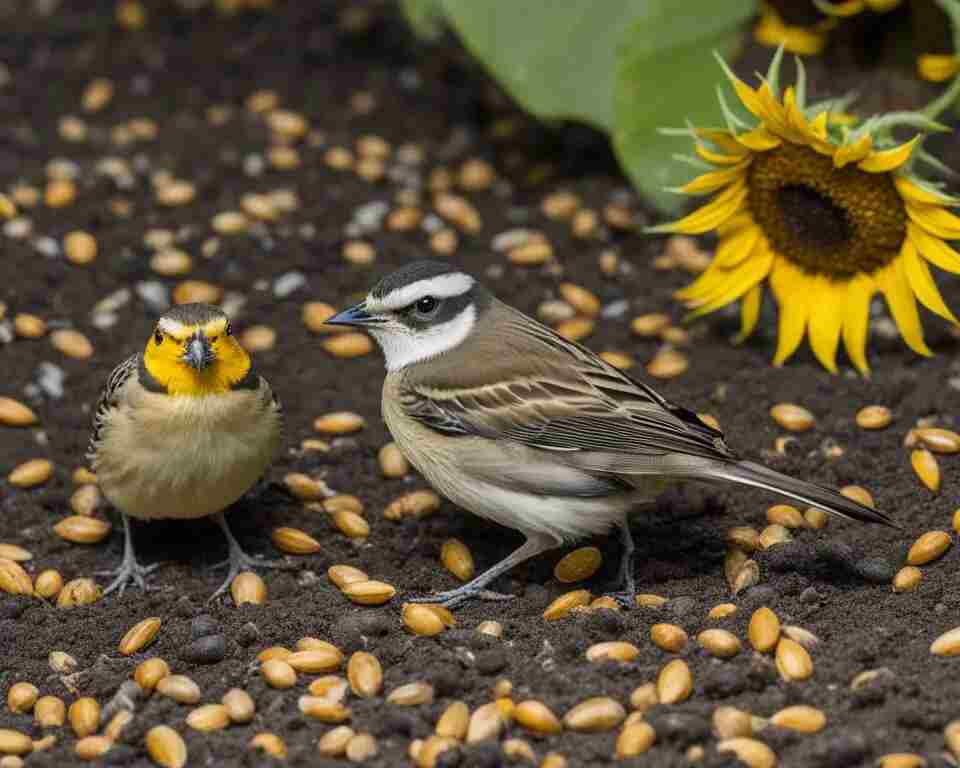As a bird enthusiast, my fascination with the variety of foods for our feathered friends led me to ponder the role of sunflower seeds. Often a staple in bird feeders, concerns about their impact on bird health prompted the question: Are sunflower seeds bad for wild birds?
In this article, we will look into the potential benefits and risks associated with feeding sunflower seeds, examining their nutritional value and effects on bird feeding habits. Understanding these aspects guides optimal bird diet choices and reveals the truth about sunflower seeds’ impact on bird health.
Table of Contents
Key Takeaways:
- Sunflower seeds are a popular choice for feeding wild birds
- There is debate about the impact of sunflower seeds on bird health
- Understanding the nutritional value of sunflower seeds is crucial
- Feeding habits and dietary balance play a significant role in bird nutrition
- Proper bird feeding practices ensure the health and wellbeing of our feathered friends
The Surprising Nutritional Value of Sunflower Seeds for Birds
Sunflower seeds offer a surprising amount of nutritional value for birds. They are rich in good fats, such as omega-3 and omega-6 fatty acids, which are essential for maintaining healthy body weight and regulating body temperature. These good fats play a crucial role in promoting energy production and supporting overall avian health.
Understanding Good Fats in Bird Diets
Good fats, like the ones found in sunflower seeds, provide birds with a concentrated source of energy. These fats help birds sustain high levels of activity, such as flying long distances, foraging for food, and defending their territories. In addition, these fats assist in the absorption of fat-soluble vitamins and help maintain the health of feathers and plumage.
Protein and Other Nutrients Essential for Avian Health
In addition to good fats, sunflower seeds also provide a significant amount of protein and other essential nutrients that are vital for avian health. Protein is essential for muscle development, tissue repair, and proper growth. It is especially important during periods of high energy expenditure, such as breeding, molting, and migration.
Furthermore, sunflower seeds contain vitamins and minerals that support various physiological processes in birds. These include vitamin E, which acts as an antioxidant, and minerals like magnesium and phosphorus, which are crucial for bone and muscle health.
Comparing Sunflower Seed Varieties: Striped, Hearts, and Chips
When incorporating sunflower seeds into a bird’s diet, it is important to consider the different varieties available. Striped sunflower seeds are the most common type and are suitable for a wide range of bird species. They have a hard outer shell, which makes birds work harder to access the inner seed, providing mental stimulation and promoting natural foraging behaviors.
Sunflower hearts, on the other hand, have the outer shell removed, making them easier for birds to eat. This variety is especially loved by smaller birds like finches and sparrows.
Sunflower chips are bite-sized pieces of sunflower seeds with the shell removed. This variety is ideal for birds with limited foraging skills, such as younger or injured birds, as it reduces the effort required for consumption.
| Sunflower Seed Variety | Nutritional Values | Benefits |
|---|---|---|
| Striped Sunflower | Fat: 28%, Fiber: 25%, Protein: 15% | Attracts a variety of bird species, high in essential nutrients, Vitamins A, B, C, and D, Potassium, Calcium, Iron, Magnesium |
| Black Sunflower | Fat: 30%, Fiber: 20%, Protein: 16% | Popular choice for many bird species, provides energy and nutrients, Vitamins A, B, C, and D, Potassium, Calcium, Iron, Magnesium |
| Sunflower Hearts | Fat: 26%, Fiber: 35%, Protein: 24% | Ideal for smaller birds, no shells, less waste, high in protein, Vitamins A, B, C, and D, Potassium, Calcium, Iron, Magnesium |
| Sunflower Chips | Fat: Varies, Fiber: Varies, Protein: Varies | Convenient and ready-to-eat, suitable for a variety of bird species, Vitamins A, B, C, and D, Potassium, Calcium, Iron, Magnesium |
By offering a variety of sunflower seed types, bird enthusiasts can cater to the diverse nutritional needs and feeding behaviors of different bird species.
| Types of Sunflower Seeds | Nutritional Composition |
|---|---|
| Striped | Rich in good fats, protein, vitamins, and minerals |
| Hearts | High in good fats, protein, and essential nutrients |
| Chips | High in good fats, protein, and essential nutrients; easier for birds to consume |
Are Sunflower Seeds Bad For Birds
This section will look into the research and expert opinions surrounding the topic to provide a comprehensive analysis of whether sunflower seeds are bad for birds. We will explore potential health concerns, including sunflower seed toxicity and allergies in avian species.
Sunflower seed toxicity in birds is a topic of concern among bird enthusiasts. While sunflower seeds themselves are not inherently toxic to birds, there are certain factors to consider. Birds have different digestive systems than humans and may struggle to break down the tough shells of sunflower seeds.
If birds consume a large quantity of sunflower seed shells, it can lead to gastrointestinal blockages. Therefore, it is important to offer sunflower seeds without shells or opt for hulled sunflower seeds to mitigate this risk.
Bird seed allergies are another potential issue when it comes to sunflower seeds. Just like humans, birds can develop allergies to certain foods, including sunflower seeds. Though rare, some birds may exhibit allergic reactions such as skin irritations or respiratory problems when consuming sunflower seeds.
If you notice any adverse symptoms in your feathered friends after feeding them sunflower seeds, it is important to consult a veterinarian for further guidance.
Bird Feeding Habits and Sunflower Seed Consumption
To understand the impact of sunflower seeds on birds, it is important to consider their feeding habits and dietary preferences. By catering to their specific needs and providing a variety of food choices, we can ensure that birds receive optimal nutrition for their health and well-being.
Wild Bird Seed Preferences and Dietary Balance
Birds have diverse preferences when it comes to their seed choices. Different species have varying feeding habits and may favor specific types of bird seeds. Knowing their preferences can help us create a bird-friendly environment, attracting a wide range of birds to our feeders.
A balanced diet is essential for birds’ overall health. Just like humans, birds require a combination of proteins, carbohydrates, fats, vitamins, and minerals to thrive. To achieve dietary balance, we can offer a variety of bird seed options, including sunflower seeds, along with other nutritious alternatives such as millet, nyjer seeds, and suet.
When providing bird seeds, it is important to ensure that they are fresh and free from mold or contaminants. Stale or spoiled bird seeds can pose health risks to birds and should be discarded.
Challenges of Bird Diet Management
Managing bird diets can present certain challenges. One common challenge is the issue of unwanted visitors, such as squirrels or larger birds, depleting the bird seeds meant for smaller species. To address this, we can use specialized feeders designed to deter larger animals, ensuring that the appropriate birds can access the food.
Another challenge is the potential for sunflower seed shells to accumulate around bird feeders. These shells can create a messy and unhygienic environment that may discourage birds from feeding. Regular cleaning and maintenance of bird feeders can help prevent seed shell buildup and ensure a clean feeding area for birds.
Importance of Bird Feeding Safety and Proper Nourishment
When feeding birds, it is essential to prioritize their safety. Avoid placing bird feeders near windows or reflective surfaces that may cause birds to collide and suffer injuries. Additionally, keeping bird feeders clean can help prevent the spread of diseases among bird populations.
Providing birds with a healthy diet contributes to their overall well-being. By offering a variety of high-quality bird seeds and supplementing their diet with fresh fruits, vegetables, and clean water sources, we can support their growth, energy levels, and immune systems.
Conclusion
In conclusion, sunflower seeds can be a valuable addition to a bird’s diet, providing essential nutrients and energy. These seeds are rich in good fats, proteins, and other essential nutrients that are crucial for avian health. By incorporating sunflower seeds into their diets, bird enthusiasts can help support the wellbeing of their feathered friends.
However, it is important to acknowledge the potential risks and limitations associated with sunflower seed consumption. Birds have varying feeding habits and dietary preferences, and it is essential to understand these factors when providing their nutrition. Additionally, it is crucial to prioritize bird seed safety and practice proper avian nutrition to ensure optimal health.
To make informed decisions about feeding birds, it is essential to consider the specific nutritional needs of different bird species. By understanding their feeding habits, dietary balance, and avian nutrition, bird enthusiasts can provide a well-rounded diet that includes sunflower seeds as a beneficial component.
By adopting safe bird feeding practices and maintaining a balanced approach, we can enjoy the beauty of wild birds while supporting their health and wellbeing.





